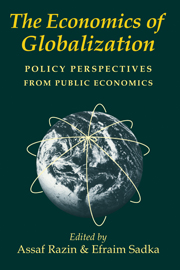Book contents
- Frontmatter
- Contents
- Preface
- List of Contributors
- Introduction
- I International Mobility of Technology
- II Capital Flows and Exchange-Rate Misalignment
- III Tax Incentives and Patterns of Capital Flows
- IV Limits to Income Redistribution in Federal Systems
- V Tax Harmonization, Tax Coordination, and the “Disappearing Taxpayer”
- 8 Is There a Need for a World Tax Organization?
- 9 Taxation, Financial Innovation, and Integrated Financial Markets: Some Implications for Tax Coordination in the European Union
- 10 Can International Commodity-Tax Harmonization Be Pareto-Improving When Governments Supply Public Goods?
- 11 Fiscal Separation with Economic Integration: Israel and the Palestinian Authority
- VI Political-Economy Aspects of International Tax Competition
- VII Migration of Skilled and Unskilled Labor
- VIII Fiscal Aspects of Monetary Unification
- Index
9 - Taxation, Financial Innovation, and Integrated Financial Markets: Some Implications for Tax Coordination in the European Union
Published online by Cambridge University Press: 28 January 2010
- Frontmatter
- Contents
- Preface
- List of Contributors
- Introduction
- I International Mobility of Technology
- II Capital Flows and Exchange-Rate Misalignment
- III Tax Incentives and Patterns of Capital Flows
- IV Limits to Income Redistribution in Federal Systems
- V Tax Harmonization, Tax Coordination, and the “Disappearing Taxpayer”
- 8 Is There a Need for a World Tax Organization?
- 9 Taxation, Financial Innovation, and Integrated Financial Markets: Some Implications for Tax Coordination in the European Union
- 10 Can International Commodity-Tax Harmonization Be Pareto-Improving When Governments Supply Public Goods?
- 11 Fiscal Separation with Economic Integration: Israel and the Palestinian Authority
- VI Political-Economy Aspects of International Tax Competition
- VII Migration of Skilled and Unskilled Labor
- VIII Fiscal Aspects of Monetary Unification
- Index
Summary
Introduction
The past decade has witnessed major changes in the volume, composition, and direction of international capital flows, as well as a wave of deregulation and financial innovation. For the most part, public-finance economists have concentrated their attention on the opportunities this new climate has created for tax evasion and tax competition (Mintz, 1992; Gordon 1995; Tanzi, 1995). By contrast, tax practitioners and financial-market participants have tended to stress the inconsistencies of existing tax systems, the tax impediments to the smooth working of markets, and the inefficiencies of the established anti-tax-avoidance mechanisms (Scholes and Wolf son, 1992; Plambeck, Rosenbloom, and Ring, 1996). Not surprisingly, these different perspectives suggest vastly different policy recommendations.
This study has three objectives. The first is to illustrate that, contrary to a view common among public-finance specialists, the contraction in source-based taxes on portfolio capital flows (i.e., withholding taxes) owes much less to tax competition for “hot-money flows” than to a number of other factors: (1) the increase in the number of institutional investors who benefit from a special tax status in their home countries that they wish to maintain abroad, (2) the expansion of international transactions in securities and the inefficiencies of withholding-tax regimes, and (3) the difficulty, if not impossibility, of applying gross-basis withholding taxes to a number of new financial instruments.
The second objective is to examine the complications involved in operating a full-fledged global income tax based on the residence principle in light of the changes that have occurred in the financial system.
- Type
- Chapter
- Information
- The Economics of GlobalizationPolicy Perspectives from Public Economics, pp. 187 - 221Publisher: Cambridge University PressPrint publication year: 1999



